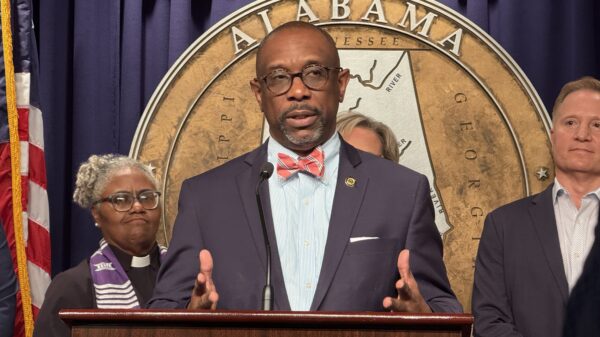By Bill Britt
Alabama Political Reporter
MONTGOMERY—A recent study in Public Administration Review shows the negative impact of public corruption on a state’s economic future. Alabama is listed in the top ten most corrupt states in America.
In a report entitled, “The Impact of Public Officials” Corruption on the Size and Allocation of U.S. State Spending,” authors Cheol Liu of the City University of Hong Kong and John L. Mikesell of Indiana University, Bloomington define public corruption as “misuse of public office for private gain.” In their work, they find that public and private corruption results in “lower-quality work, reduced economic productivity and higher levels of income inequality and poverty.”
This investigation also found that states with the highest levels of corruption tend to spend more taxpayer funds on construction, highways, and police protection programs. This, in turn, facilitates corrupt officials to use public money for personal gain and less money on education, healthcare and welfare.
A February article in USA Today cites a Gallup-Healthways survey, in which participants were asked a “large range of questions to determine the well-being” of a state’s citizen. In the poll, Alabama ranked fourth lowest, only ahead of West Virginia, Kentucky and Mississippi.
The survey found that life expectancy in Alabama was second lowest; the percentage of obesity was 28.1 percent, making Alabamians tied for twentieth place; median household income was fourth lowest; and the percentage of individuals with high school diplomas was sixth lowest.
The USA Today report found that, “The relatively low income of many state residents may have made it difficult for them to access basic necessities. Relatively few Alabama residents said they had enough money to afford medicine, food or adequate shelter. Alabama residents also had among the worst physical health in the nation. High blood pressure and diabetes in particular were much more common in Alabama than in most other states. Also, there were 236 deaths per 100,000 people due to heart disease, the second-most nationwide.”
This would suggest that our State’s lack of spending on education, health and other investments in human capital, corresponds to our State’s ranking as the eighth most corrupt state in the Union.
The report finds that, “Increases in states’ expenditures on capital, construction, highways and borrowing are not problematic in themselves…. However, policy makers should pay close attention that public resources are not used for private gains of the few but rather distributed effectively and fairly.”
The recent conviction of disgraced lawmaker Rep Greg Wren, R-Montgomery offers a window into how a portion of the State’s $700,000,000 Medicaid program was offered up in a scheme to give one company a monopoly over the Medicaid prescription drug program.
Wren has plead guilty to helping Speaker of the House Mike Hubbard, R-Auburn, place language into the State’s budget that would benefit only one Alabama business, American Pharmacy Cooperative, Inc., while providing Wren and Hubbard with lucrative consulting contracts.
Medicaid is a safety net for Alabama’s most vulnerable citizens, with half of the State’s births being paid for out of the fund. It is also a large portion of Alabama’s General Fund Budget.
When lawmakers are accused (and in this case convicted) of selling out the Medicaid program for personal gain, is it any wonder why that state would have a “well-being” index this low?
Alabama is a state that has suffered greatly from unemployment and underemployment.
“The number of people unemployed in Alabama peaked in September 2009 at 221,367. There are now 74,026 fewer people unemployed in the State. From a recent trough of 129,633 in December 2013, the number of unemployed has now grown by 17,708,” according Labor Bureau statistics.”
Even though the State has spent millions on tax-based business development incentives, the State languishes in poverty.
Many studies show that public corruption results in a long-term negative effect on economic growth, through its impact on “investment, taxation, public expenditures and human development.”
In a 2011 study, “Who Offers Tax-Based Business Development Incentives?,” researchers found that “states with troubled political cultures demonstrate the greatest willingness to offer business development incentives.”
In the last four years, Alabama has seen an increase in huge tax-based incentives to recruit business. However, employment remains stagnant.
The “Incentive” study shows that “states with troubled political cultures are more likely than others to have dysfunctional tax and regulatory systems that make it difficult for them to compete for businesses except by offering special incentives.”
It also found that, “It is not guaranteed that business development incentives encourage local economic activity, as incentives can be costly, possibly coming at the expense of general tax reductions, education or infrastructure improvements, or other uses of funds that could impact business activity to an even greater extent than do incentives.”
Alabama Department of Commerce does not offer empirical studies on cost versus return on investments to evaluate the effect of business development incentives.
The lucrative nature of these taxpayer fund so-called “job creation projects,” has even lured former Gov. Bob Riley to become one of the State’s most visible lobbyist. Just seven months after leaving office in 2011, Riley launched Bob Riley & Associates and registered as a lobbyist, along with his daughter, Minda.
Riley has been involved with the hundred million dollar Airbus deal in Mobile as a registered lobbyist for EADS North America.
Riley is also a lobbyist for Austal USA, LLC, a company that, as governor, gave $5 million in economic development grants, in 2008, and $5 million again in 2009.
The payments stopped in 2010 (an election year) and did not resume in 2011,(budgeted during election year session). The payments to Austal began again under Gov. Bentley’s administration with the state giving $5 million in 2012 and $10,255,470.9 in 2013. So, far in 2014, Austel has received almost 4 million in grants and benefits.
The intersection of public office, economic development by taxpayer funded incentives and public corruption is not unusual. Neither is the cost to a state’s citizens.
According to Marie Chêne of Transparency International, “Not only does corruption affect economic development in terms of economic efficiency and growth, it also affects equitable distribution of resources across the population, increasing income inequalities, undermining the effectiveness of social welfare programmes and ultimately resulting in lower levels of human development. This, in turn, may undermine long-term sustainable development, economic growth and equality.”
According to the FBI, “Public corruption poses a fundamental threat to our national security and way of life. It impacts everything from how well our borders are secured and our neighborhoods protected…to verdicts handed down in courts…to the quality of our roads, schools, and other government services. And it takes a significant toll on our pocketbooks, wasting billions in tax dollars every year.”
Repeatedly, Alabama is listed among states in which public corruption is rampant.
Over the last two decades, investigations into public corruption within the State have ensnared governors, educators and legislatures. However, suspect judges have provide an escape-hatch for some. Most of the State’s officials who have been brought to justice have been Democrats.
Lately, it is the Republican lawmakers that are feeling the heat of investigation. They, like their Democratic predecessors, are shouting political prosecution. And true to form, political parties have closed ranks in front of those accused of wrong doing.
According to the best research available, public corruption robs a state of it future by allowing a handful of corrupt men and women to prosper, while leaving the rest of society to wonder why their lives are so bleak.




















































